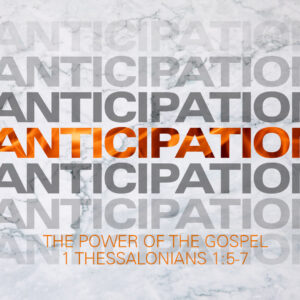Series Summary
anticipation – noun /an-ti-sə-pā-shən/ – A feeling of excitement about something that is going to happen in the future; the visualization of a future event or state.
Paul’s visit to Thessalonica is described in Acts 17, but his stay there was short due to the jealousy of the Jewish leaders, who incited a mob. Paul moved on to Corinth, where he wrote a letter back to this church that he loved. Because of their persecution, they were looking forward expectantly to the return of Christ, with expectant anticipation for what the future held. This letter is filled with encouragement and insight about growing in godliness and faith, and how spiritual growth should be motivated by their hope in the ultimate return of Jesus Christ.
Although a brief letter, 1 Thessalonians is centered on Paul’s message of hope, encouragement, and preparation for the return of Christ. This epistle, one of Paul’s earliest letters, addresses a young church facing persecution and uncertainty. Paul commends their faith, love, and endurance, but also exhorts them to grow in holiness and remain steadfast as they await Christ’s return. The overarching theme of anticipation provides both a source of comfort and a call to action for believers as they navigate the tension between present challenges and future hope.
Paul begins the letter by expressing his gratitude for the Thessalonians’ vibrant faith, love, and hope in the gospel. He reminds them of how the gospel came to them not only in word but in power, and how they became examples to others in their faithfulness. This sets the stage for the theme of anticipation, as their faith points forward to the ultimate hope of Jesus’ return. Paul emphasizes that the promise of Christ’s return gives meaning to their perseverance and fuels their mission to live as witnesses of God’s transformative power.
The theme of Christ’s return is explicitly addressed in every chapter, culminating in Paul’s detailed description of the second coming in chapter 4. His words are encouraging, and issue a call to live as people of the light, avoiding complacency and spiritual lethargy, and to be watchful and self-controlled as we await the Day of the Lord.
To do so requires the pursuit of holiness and love in our everyday lives as we look for Christ’s return. Anticipation of the second coming is not an excuse for passivity but a motivation for active faith and obedience. Believers are to live with the awareness that their actions have eternal significance, striving to please God in all things.
Anticipation. We live with the same sense of expectancy. Paul’s letter of 1 Thessalonians challenges and encourages Christians to embrace a forward-looking faith that transforms the present while eagerly awaiting the fulfillment of God’s promises in Christ.
Sermon Summary
In 1 Thessalonians 1:5-7, Paul highlights the powerful example set by himself, Silas, and Timothy in delivering the gospel to the Thessalonians. As we have already seen, their message was not just words, but it was God’s Word, and it came with deep conviction, power, and the Holy Spirit. Their lives reflected the truth they preached, demonstrating faith and integrity. The message that Paul shared had the power to transform their lives.
The Thessalonians responded by becoming imitators of Paul. This wasn’t just an outward copying of behavior, but a genuine transformation of heart and life. They embraced the gospel wholeheartedly, even in the midst of affliction and suffering. This wasn’t an obstacle; it actually refined their faith, and deepened their dependence upon the power of God.
As a result, the Thessalonian believers themselves became an example to the believers around them. Their faith was so evident that it inspired others, creating a ripple effect of encouragement and boldness among fellow Christians. They demonstrated that true discipleship leads to multiplication. And, they experienced the joy of the Holy Spirit, which was not based on circumstances but on their relationship with Christ.
We are challenged to consider our own faith and witness. Are we living in such a way that others see the power of the gospel in us? Are we willing to endure hardships for Christ, finding joy in Him despite difficulties? Like the Thessalonians, may we not only receive the gospel but also live it out, becoming examples that inspire and encourage others in their faith and growth, too.

